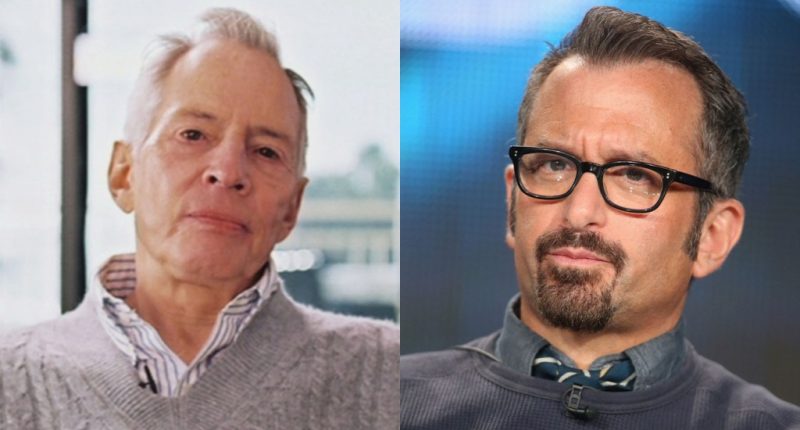[This story contains some spoilers from the premiere of The Jinx — Part Two.]
When speaking recently about the remarkable series of events that led to Robert Durst‘s arrest one day before The Jinx aired its season one finale in 2015, the filmmakers behind The Jinx — Part Two, which premiered its six-episode follow-up on Sunday, revealed that director Andrew Jarecki knew from the FBI when Durst went on the run.
“Andrew knew that he was already on the run because there was some talk about some personal danger that Andrew was in,” executive producer Zac Stuart-Pontier told The Hollywood Reporter. “So, he did know that for those four or five days that [Durst] was on the run. But this was not common knowledge.”
Jarecki acknowledged there was confusion about what the public knew at the time, including when the filmmakers submitted evidence for the police investigation into Durst for the 2000 murder of his close friend, Susan Berman. The Jinx — Part Two explained via a title card that the filmmakers first handed over evidence in 2013, years before the show premiered. The filmmakers also recently spoke about how they discovered Durst’s shocking bathroom audio confession two years after they had filmed it, and handed that over as well.
“The average person thinks, ‘Well, if you have evidence of a murder, of course the police will go out and arrest the guy.’ And we thought that, too,” Jarecki recently told THR. “And then when we met with [L.A. deputy district attorney] John Lewin [who appears in Part Two], he said, ‘Just to let you know, these [cold] cases usually take me five years.’ We’re like, ‘This guy has definitely murdered three people already. It’s very possible he’ll do it again. It’s possible I’ll be one of them.’ And he said, ‘Well, the worst thing you can do, if you are a district attorney’s office, is bring a prosecution before you’re ready … If you’re going to do it, you gotta take him down.’”
In the latest episode for their Official Jinx Podcast for HBO, Jarecki and Stuart-Pontier delved deeper into how Jarecki feared for his safety before Durst was ultimately apprehended in New Orleans, where he would then be extradited to California and eventually tried and convicted for the first-degree murder of Berman.
The Jinx — Part Two premiere had exposed the parallel events of Durst going on the run while the first season, The Jinx: The Life and Deaths of Robert Durst, was airing weekly in February and March of 2015. Durst packed his bags after watching in real time the penultimate fifth episode, which revealed that Durst’s handwriting matched that of the “cadaver note” believed to have been written by Berman’s murderer.
“We had a friendship of sorts,” explained Jarecki in the podcast.
Durst had famously reached out to the filmmaker after he was impressed with the feature film Jarecki directed based on Durst’s life, 2010’s All Good Things, and was then voluntarily interviewed over the course of 21 hours for the first season of The Jinx.
“It was not a traditional friendship, it was not something that either one of us expected,” he continued, “but we were thrown together in this weird way. And then we spent a lot of time together and talked and had a lot of conversations. I think Bob is figuring out that, starting with episode four, maybe we’re not friends anymore. And then episode five, we’re definitely not friends.”
The Jinx — Part Two took viewers through Durst’s steps once he began to flee. But the series did not touch on Jarecki’s conversations with the FBI at that time, which he revealed in the podcast.
“I said to them, ‘I think there’s a risk to me. And I’m okay with that, but I’d like to have a plan in place if anything weird happens,’” Jarecki recalled. “And then I remember calling up my guy and having him say, ‘Yeah, we really have no idea where he is.’ And I said, ‘Well, how’s that possible? You’re the FBI, right? You’re the Federal Bureau of Investigation. You should be the boss of where people are, especially if they’re putting witnesses at risk or whatever.’ And he said, ‘Well, you know, I will keep you posted if we notice anything.’ So that was not confidence inspiring.”
Stuart-Pontier said that Jarecki hired security to protect himself and his family as a precaution while Los Angeles detectives were at Durst’s empty apartment in Houston trying to piece together his movements. Durst, who would go on to turn off his cell phone and use the alias Everett Ward, never returned to that apartment.
“My daughter was quite young at the time, maybe she was 11, and I remember saying sort of nonchalantly, ‘Hey, uh, tomorrow morning when I take you to school, we’re going to have a couple of other guys, you know, helping me take you to school.’ And she immediately started crying. And I thought, all right, well, she gets it. Maybe I should take this seriously,” said Jarecki.
The FBI had a wiretap on Durst’s phone and days later, the day before the Jinx part one finale, March 15, 2015, they heard Durst trying to log into his voicemail and were able to trace him to the Marriott Hotel in New Orleans where he was apprehended.
In the podcast, Jarecki explained why Durst chose Everett Ward as his alias.
“The name Everett Ward came to Bob because he remembered it as the name of another guy who had bought a bow saw at Chalmers Hardware. There had been two bow saws bought around that time. One is the one that Bob bought, in order to use it to dismember Morris Black, and the other one was a bow saw bought by a guy named Everett Ward,” said the director.
When The Jinx premiered, Durst was introduced as a New York real estate heir who had been suspected of three murders, but never convicted: his first wife, Kathleen McCormack Durst, who disappeared in 1982; his close friend Berman, who was shot dead execution-style in December 2000; and his neighbor Morris Black, whom he dismembered but was acquitted of murdering, claiming self-defense, in 2001.

Robert Durst with Susan Berman in a photo shown in The Jinx — Part Two.
HBO
When Durst was arrested, he was found with more than $40,000, a loaded firearm, a map of Cuba and a “lifelike flesh-colored mask” that Durst had commissioned to use as a disguise. In the evidence room, the filmmakers were able to find a contact for the mask maker. They used the mask in the recreations shown in The Jinx — Part Two.
“It was really spooky because you could put a hat on and you could walk around, and I think the crew would not necessarily know that that was a person wearing a mask,” said Jarecki. “If you get right up close to it, you would say, ‘that face is moving weirdly,’ but it was quite scary to see that you could just see somebody walking through Grand Central wearing a mask like that, and you probably wouldn’t notice it.”
In the podcast, the filmmakers also played more of the tapes from Lewin’s questioning of Durst following the arrest, including Durst’s claim that he was on methamphetamine during his Jinx interviews. Both Jarecki and Stuart-Pontier told THR that they did not believe that Durst was on drugs, noting that Lewin simply told Durst that claim was “bullshit.”
“He loves to smoke weed. It’s not impossible that he took a hit on his way over. He’s a wake-and-bake kind of guy. So, is it possible that early on he was stoned? A little. Maybe,” Stuart-Pontier had told THR. “But the guy spends his whole life stoned, so I don’t know how much that affected him. Beyond that, I think we would have known. He was totally with it. He was getting up, he was moving around. He was interacting with people. He’s a weirdo, but I don’t believe he was on drugs.”
While he was jailed in New Orleans and awaiting extradition, Jarecki also revealed on the podcast that he tried to go see Durst.
“I felt like if Bob wanted to tell any more of his story, he was going to tell it to me, right?’” said Jarecki. “We did have a shorthand and I did think that there’s a pretty good chance that he was going to plead guilty. And I thought, well, if he wants to unburden himself, or something, I have a responsibility to be there. It’ll be fascinating to be there. I just want to hear what he has to say at this point.”
Jarecki wrote a letter to Durst, which he read on the podcast. (One line read: “The Bob Durst phenomenon has become a real cultural touchstone.”) When he arrived at the St. Charles Parish Correctional Center in New Orleans, he was told Durst was “out.” So Jarecki waited until a corrections van pulled up and Durst walked out.
“I felt a little sad for him in that moment,” he said of their encounter. “I look at him and he looks at me and I look at him and he’s sort of in the shadow and I’m in the bright sunlight. And he didn’t say anything. And then he just kind of resumed his trudge into the jail.”
Once inside, Durst ended up declining the visit.
“I wasn’t surprised when [the woman at the visitor counter] said that. But it was a little bit sad just because I thought there was a good chance that in that moment, Bob might just say, ‘Well, I’m super bored here. This is a terrible place for me to be. And this guy had a lot to do with getting me here. Maybe I’ll see what he has to say for himself,” said Jarecki.
Later, Jarecki heard Durst speaking in recorded prison conversations about his attempted visit.
“His attitude, to me, seemed, um, smart alecky,” Durst is heard saying in a recorded call. “Here is this smart alecky guy saying, ‘You know, I really fucked you.’ … Causing me to go to jail, very possibly, causing me to die in jail and I’m supposed to want to talk to him about it.”
Durst continued, “I can see it being guilt for him… the Jarecki stuff makes me feel like a deer or rabbit that’s being hunted but it doesn’t know it’s being hunted and it’s helping the hunters.”
In reaction to hearing those comments, Jarecki said, “He says that when he thinks about The Jinx, he realizes that he didn’t understand what was happening. He didn’t understand the jeopardy that he was putting himself in. Because he doesn’t know he’s being hunted. And that’s a very kind of chilling concept.”
In September 2021, Durst was convicted of Berman’s murder, including the special circumstance that he killed her as a witness because of what she might reveal about what happened to Durst’s first wife, Kathie, whose body was never found. He was sentenced to life in prison without the possibility of parole. Two months later, he was indicted on the charge of second-degree murder in Kathie’s killing. However, he died while in custody of the California Department of Correction, in January 2022, at age 78 before a trial could begin.
The Jinx — Part Two releases new episodes Sundays. Listen to the official HBO podcast here.
Also Read More: World News | Entertainment News | Celebrity News









